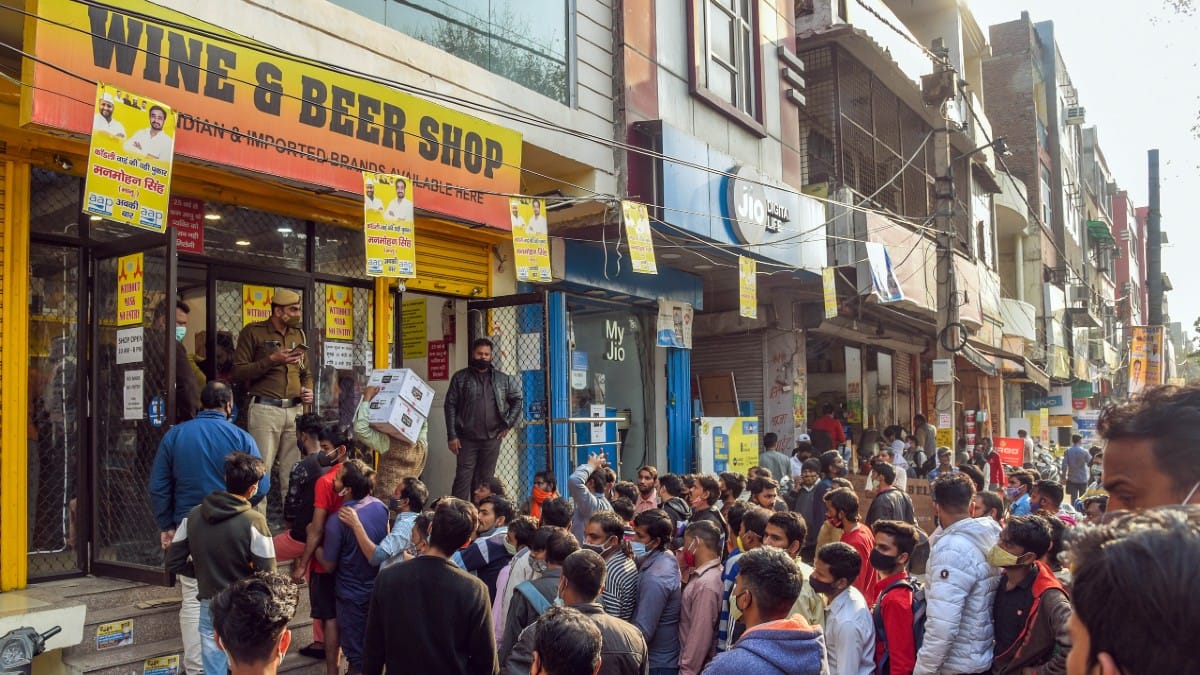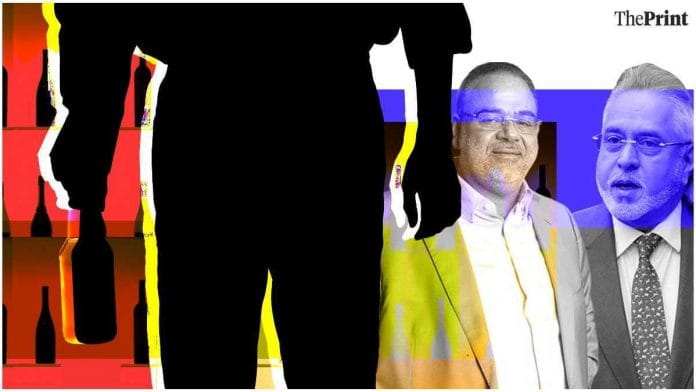There was a time when the word liquor baron invoked images of conspicuous flaunting of wealth, power and machismo. Local city reporters used to be the first ones to notice their lifestyle and sudden rise, things that would make for rich, juicy stories. But reporters in Uttar Pradesh’s Varanasi now say the younger generation of old businessmen are a changed lot. They desperately want to shed the ‘liquor mafia’ tag.
A simple Google search will throw up results that portrayed them as ‘samaj sevaks’, or social workers.
Anshul Agrawal, a young reporter with a local Hindi daily in Varanasi, grew up reading about the fascinating and colourful lives of Seemanchal’s liquor kings. ‘Once a chakhna seller, now a liquor king,’ is how a news headline read many years ago, highlighting their humble roots as street vendors, says Agrawal.
The last ‘liquor king’ to make headlines was Gurdeep Singh ‘Ponty’ Chadha, who was killed in a shootout with his brother in 2012. Chadha was the biggest liquor businessman whose 10 billion dollar empire spanned Uttar Pradesh, Delhi, Uttarakhand, Punjab, Rajasthan and Chhattisgarh. His lavish lifestyle was a fodder for living room talk.
In the decade since Ponty Chadha’s death, no one has risen to fill his shoes in terms of flamboyance, aura and brazen projection of money and political power.
“I tracked the industry when their larger-than-life stories were written and read about. I haven’t come across any new faces in the liquor industry,” said Pankaj Parashar, a senior journalist.
Today, the liquor industry is fractured. It doesn’t have the dominating presence of one kingpin like Vijay Mallaya or Ponty Chadha. In the last ten years, state after state has moved to bring the liquor industry under its control, leaving little room for businessmen to rise the way Ponty Chadha did.
Now, the liquor kings are hardly ‘kings’. They remain low key. Their businesses are local, their swagger is limited and they function with no political patronage.
When the Arvind Kejriwal government rolled out its new excise policy for Delhi in 2021-22 allowing private players to sell alcohol, there were fears that it would usher in a new era of liquor kings, the next Ponty Chadha. But the government’s withdrawal of the new policy on 1 August means it’s back to the old status quo.
Also read: Rush, chaos outside liquor shops as Delhi govt decides to roll back new excise policy
Big changes in excise policies
Dilip Jaiswal, a liquor businessman from Varanasi, is a bitter man. It is “a curse,” he says of the industry that he has been a part of for more than 25 years.
In a decade marked by policy reforms, Uttar Pradesh has toppled two of the biggest liquor businessmen in the country—Ponty Chadha in western UP and Jawahar Jaiswal in eastern UP. Jawahar, a former Member of Parliament (MP), who is currently out on bail, still runs his liquor business, but it is no longer as vast as it once was.
“This is no longer a fair game. They expect us to finance their politics, but they are taking the retail and wholesale business under their control. All the government efforts are to kill private players,” says Dilip, who has started diversifying into the hospitality sector.
When the BJP came to power in UP, the Yogi Adityanath government introduced a series of excise reforms over the years that shattered the monopoly of a handful of businessmen. Today, both wholesale and retail sale of liquor is under the government’s control, and licences are being issued to new players. It left the ‘old guard’ bitter and broke.
“We ended the zone wise breakup, and revived the wholesale sector. We allowed private persons to open distilleries in districts. They can introduce new brands and sell their liquor freely,” says a bureaucrat from the UP excise department.
“Secondly, we completely smashed the retail part. We have limited [licences] to two shops for one person. So even if big liquor businessmen opened shops in the names of their driver, driver’s wife, cook or cook’s wife, one big mafia will not be able to run 50 shops at a time. This has been a game changer for us,” he adds.
UP has also roped in first-time entrepreneurs to open liquor shops, run bars and own premium shops in malls. Last year, the government issued 75 bar licences. “Now, anyone can run a liquor shop. This was not possible earlier as these mafias would not allow them to operate,” the bureaucrat explained.
These measures have enriched the State’s coffers. In 2012-13, the government had collected Rs 9,783 crore; by 2021-22, revenue stood at Rs 36,321 crore–a growth of more than 45 per cent in one decade.
Also read: Public taboo, private brew: Hooch to foreign booze, ‘dry’ Gujarat has never had alcohol shortage
Discontent in other states
While the Uttar Pradesh government is proud of its achievements, businessmen describe the situation on ground as “absolutely disgusting”. They say they are being sidelined while politicians—from both ruling and opposition parties—exert more control over the industry. This is playing out in other states as well.
In Jharkhand, the government took over wholesale and retail sectors to boost revenue. It set up the Jharkhand State Beverage Corporation Limited (JSBCL) in 2010 to control pricing and manufacturing of liquor. Similarly, Jharkhand’s new liquor policy allows private players to procure and sell liquor even as the agencies remain under government control. In Tamil Nadu, the state marketing corporation has complete ownership of liquor outlets. Though Sasikala owns a liquor company, there aren’t any major new liquor billionaires in the state.
For Uttarakhand, alcohol is a major source of revenue. But Ponty Chadha’s monopoly over the liquor trade started declining when the state introduced a lottery system to allocate shops. In 2007-2008, the BC Khanduri government brought in new provisions that allowed shops to be owned by local people. This struck a blow to Chadha’s empire, which included several firms in the state, said an excise official. At present, Uttarakhand has a revenue target of Rs 3,600 crore for 2022-2023.
Also read: 42 deaths, 15 arrests, 6 suspensions: How ‘liquor crackdown led to’ hooch tragedy in dry Gujarat
A toast to charity
At the height of his power, Ponty was courted by politicians. The patronage he received by Punjab’s Amarinder Singh government in 2000s helped him gain control of the liquor industry. When Mayawati was UP’s chief minister in 2009, he was awarded wholesale distributors rights for the entire state. Even Mulayam Singh Yadav inaugurated his multiplex mall, Wave, in Lucknow.
Ponty’s elder son Manpreet Singh Chadha, or Monty, was seen as the person to step into his shoes. But after Ponty’s death, the family’s conglomerate Wave Group split between Monty and Chadha’s younger brother Rajinder. Since then, the two families have made a concerted effort to highlight the charity arms of their respective businesses.
They’ve moved to newer areas of influence such as providing Covid relief and setting up health camps. “The business of life is life, not business,” Ponty Chadha is quoted on the CSR website by Monty and his family. It features donation drives for differently abled children, marathons for women’s safety, food banks, sports activities and healthcare units.
Rajinder gave interviews on television during the first wave of Covid on his Dil Se Seva initiative. In the second wave, Monty opened Ghaziabad Wave City Residential township for Covid patients.
In UP, small-town businessmen have also latched onto charity work. Write-ups and photos of them distributing blankets to the homeless in winter or bags of wheat to migrants during Covid made it to the local papers.
The houses they live in are still palatial. The cars they drive are far from cheap. But they have been cut down to size, and now want to be known for their charity work. It’s the trendiest medal of honour that will demarcate them from the new crop of businessmen climbing the social ladder.
Also read: Bihar govt amends liquor law after SC rap, drinkers can now pay fine to avoid jail time
AAP, the disruptor?
There were fears that liquor businessmen would once more gain monopoly over the market when the Aam Aadmi Party government introduced new excise policies in Delhi and Punjab.
Last year, AAP changed Delhi’s liquor policy claiming that it would end the mafia controlling the trade. It divided the territory in 32 zones allowing 27 shops in each. Neighbouring states, however, had their own reservations about the outcome.
“This was another way to establish the monopoly of two to three big players in the coming years,” said an excise commissioner from a neighbouring state.“Big businessmen are known to use every trick in the book to wipe out small traders. They start selling liquor at 50% discount. Small businessmen are forced to compete with their prices, but they will not be able to keep up and eventually be out.”

But after the Lt Governor of Delhi sought a CBI probe into the new excise policy, the Kejriwal government said it was bringing back the old system. “The Delhi government’s efforts to disrupt the policy might have got them financiers but it would have dragged neighbouring states back to the old system of living at the mercy of few liquor kings,” the official said.
AAP’s experiment in Punjab too has disrupted the system for small traders. Those involved in wholesale and retail private enterprises in Punjab have also approached the Punjab and Haryana High Court. Liquor businessmen say the new liquor policy is arbitrary and also an attempt to monopolise the industry.
Also Read: Red-eyed, lost young men in Bihar’s Seemanchal show how Nitish Kumar’s alcohol ban backfired
New avenues in smaller towns
Given the uncertainty, many liquor businessmen are no longer putting their bottles in one basket. Diversification is the buzzword, with the hospitality and real estate sectors proving to be especially lucrative. This is true in Bihar where prohibition came into force only a few years ago in 2016.
“State governments started to realise that when they can control the liquor industry and generate revenue, why allow businessmen to flourish? This revenue helps them fund their own political campaigns and design welfare schemes to woo voters,” says Prakash Chandra, a businessman from Bihar, who was forced to explore other options when the Nitish Kumar government banned alcohol.
Diversification is happening across small towns in the Hindi heartland as well. Their roads are lined with shiny new automobile showrooms, shopping marts, retail stores and hotel chains. Some enterprising businessmen have started setting up ethanol plants. For example, Globus Spirits has been setting up ethanol plants in UP, Bihar and Punjab. From alcohol to clean fuel, this is the next wrinkle in the story of India’s liquor kings.
(Inputs from Shikha Salaria, Prithviraj Singh, and Somwiya Ashok)
(Edited by Prashant)






